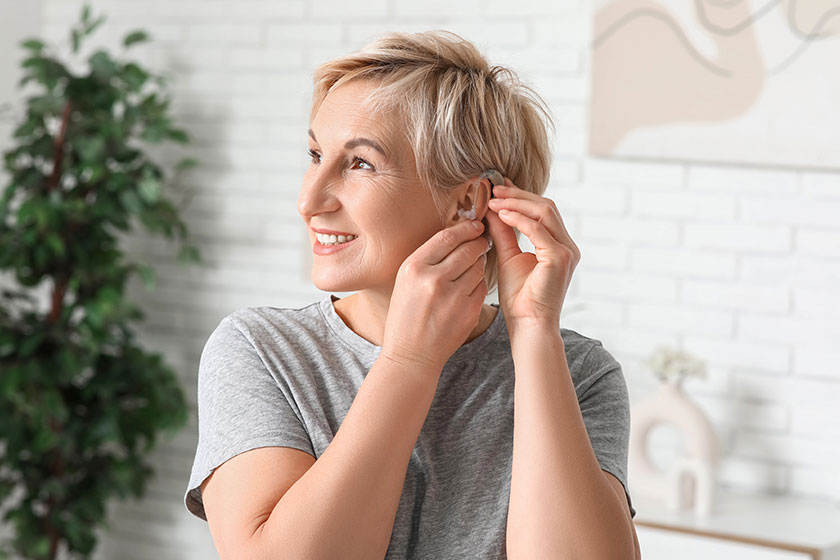As your parents transition into retirement, you may notice their needs evolving, including how they experience the world around them. Hearing loss is a common part of aging and finding the right hearing aids for parents can significantly improve their daily lives. The process of choosing the best hearing aids requires careful consideration of their hearing condition, lifestyle and comfort. Let us help you navigate the key factors involved in selecting a hearing aid that enhances your quality of life while also guaranteeing long-term satisfaction.
Understanding Hearing Loss
Hearing loss can range from mild to profound and each degree may require a different solution. A hearing healthcare professional can assess the extent of the hearing loss through a detailed hearing test, which provides a solid foundation for determining the best type of hearing aid.
Mild hearing loss may be adequately addressed by basic models, while more severe conditions could require more advanced technology, including cochlear implants or specialized hearing devices. Understanding the type of hearing loss your parents are experiencing will guide the entire decision-making process and help narrow down the options.
Comfort Is Key
Comfort is one of the most critical factors when choosing hearing aids for your parents. Hearing aids are worn for extended periods each day, so they must feel comfortable in their ears. A device that causes irritation or discomfort will likely discourage consistent use, which could diminish the benefits of the device over time. For this reason, it is important to choose a hearing aid that fits well and feels natural to wear.
There are different hearing aid styles, including in-the-ear (ITE), behind-the-ear (BTE) and in-the-canal (ITC) models, each offering a unique level of comfort and functionality. If your parents prioritize discreetness, ITC hearing aids, which sit inside the ear canal, may be a good option. However, these smaller devices can be more challenging to handle, especially for individuals who may struggle with fine motor skills. In such cases, BTE models might be more practical, as they are easier to manage and bring greater comfort for long-term wear.
Lifestyle Considerations
Your parents’ lifestyle plays a significant role in determining which hearing aid will be the best fit. Consider their daily activities, how often they socialize and their level of physical activity. For example, if your parents are active and enjoy outdoor activities or social gatherings, they may require hearing aids with advanced noise-cancellation features. This would help them manage background noise more effectively, allowing them to focus on conversations in a lively environment.
Alternatively, if your parents lead a quieter lifestyle within a retirement community, they may not need the same level of technology. However, even in quieter settings, they will benefit from features that ensure clear sound quality for activities like watching television, reading or engaging in small group discussions.
Some hearing aids now come equipped with Bluetooth connectivity, enabling them to pair with smartphones or other devices. This can be a great addition if your parents enjoy listening to music, making phone calls or using hearing aids to enhance their TV-watching experience.
Ease of Use
Many hearing aids come with advanced features, but it is important to choose a device that your parents can easily manage. Depending on their familiarity with technology, a more straightforward model may be preferable to one with complex controls. Features such as automatic volume adjustment, rechargeable batteries and one-touch controls can make the experience much more user-friendly.
In retirement, your parents may prefer not to fuss with delicate adjustments or maintenance routines, so a hearing aid that operates seamlessly will provide both convenience and satisfaction. Rechargeable models eliminate the need to replace batteries frequently, which is often a hassle for many users. Additionally, devices with intuitive controls or even app-based features for adjusting settings can bring greater flexibility without overwhelming the user.
Durability and Long-Term Maintenance
While finding a comfortable and user-friendly device is essential, you should also consider the durability and maintenance of the hearing aid. Investing in a device that can withstand everyday wear and tear makes sure that it will deliver long-lasting support. Some models are water-resistant, which can be particularly useful if your parents enjoy outdoor activities or spend time in humid environments.
In addition to durability, regular maintenance is key to keeping hearing aids functioning at their best. Most hearing aids require periodic cleaning to remove earwax or debris and your parents may need assistance with this. Make sure that they are comfortable with the level of care their chosen device requires and do not hesitate to seek professional support if needed.
The Role of Professional Guidance
Seeking professional advice when choosing hearing aids for parents can significantly streamline the process. A hearing healthcare provider can offer personalized recommendations based on your parents’ hearing test results, lifestyle and preferences. They will also make sure that the hearing aid is properly fitted and customized to suit their unique needs.
Hearing aids are not a one-size-fits-all solution and professional guidance will help fine-tune the device to match your parents’ specific hearing requirements. After the initial fitting, it is important to schedule follow-up visits to adjust the settings as needed and to guarantee the device remains comfortable and effective over time.
Enhancing Their Quality of Life
Choosing the right hearing aid for your parents is not just about improving their hearing; it is about enhancing their overall quality of life. With the appropriate device, your parents can continue to participate fully in social activities, family gatherings and the various activities and events offered in a retirement community. Whether they enjoy attending group discussions or taking part in health and wellness programs, the right hearing aid will enable them to remain engaged and connected with those around them.






